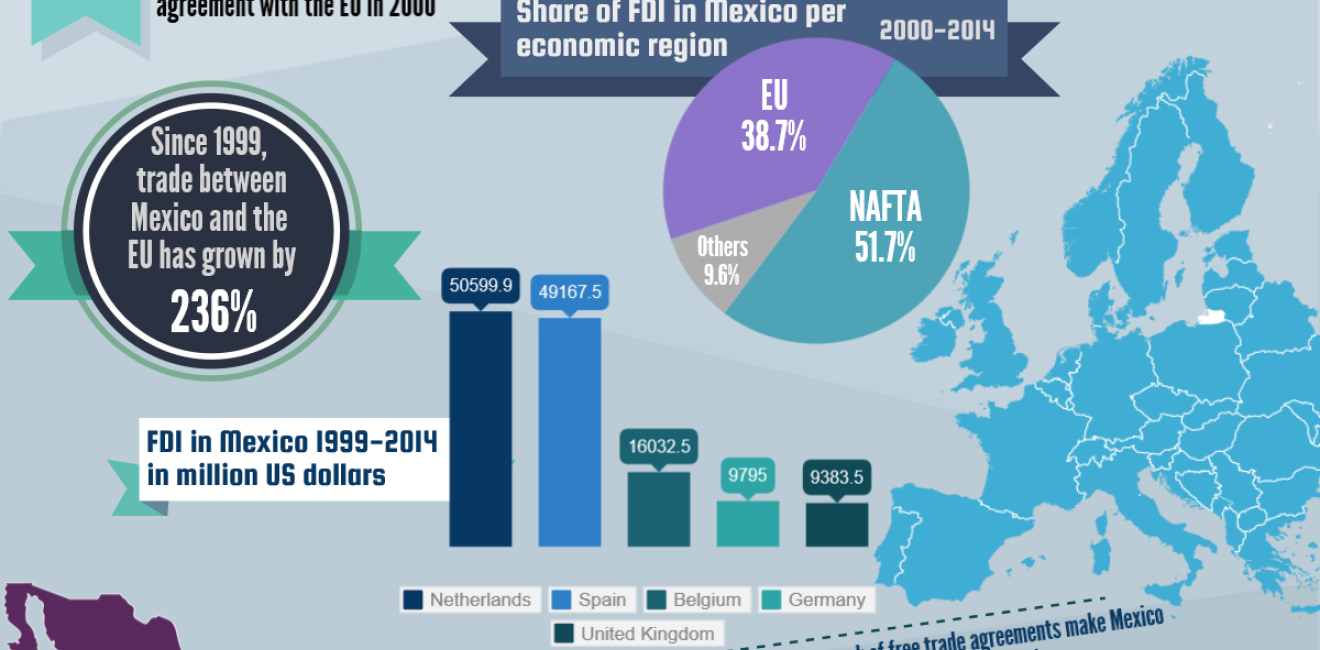European Trade & Investment in Mexico  When discussing Mexico’s international trade relations, the focus is often on the country’s deep economic entanglement with its northern neighbor. Indeed, the United States constitutes Mexico’s largest import and export partner, and the interdependence between the two markets is extensive. Nonetheless, it is often overlooked that Mexico also enjoys important trade relations with the European Union and its individual member states. The European Union and Mexico entered into a Free Trade Agreement in 2000, establishing the free movement of goods and services between the two regions. The agreement was the first transatlantic free trade partnership signed by the EU. Trade between Mexico and the EU has since grown by 236.4%, and amounted to $63 billion in 2013. The European Union currently constitutes Mexico’s second largest export market after the United States. Conversely, the EU is Mexico’s third largest provider of imports after the U.S. and China. Investments made in Mexico by European businesses are substantial. With over one third of FDI coming from the EU, the economic area constitutes Mexico’s second largest source of foreign direct investment. Within the region, Mexico’s most significant investing companies are based in the Netherlands, Spain, Belgium, Germany and the United Kingdom. European business investments concentrate on manufacturing, construction and financial services. Moreover, since the Spanish-owned banks BBVA Bancomer and Santander Serfin operate in the country, as well as the British HSBC, three out of five major banks in Mexico are of European origin. Within the telecommunications sector, the Spanish Telefónica Movistar stands out, having invested $273 million in 2014 alone, which will inevitably expand mobile networks and adapt distribution channels. The beverage industry in Mexico is another attractive sector for investment. The Dutch Heineken brewery acquired a major beer production company for $6.5 billion in 2010. In fact, FDI from Europe peaked in 2013 as a result of the multi-billion acquisition of the Mexican Grupo Modelo by Belgian InBev, the world’s largest beer producer. Germany has emerged as Mexico’s most important trade partner within the EU. German companies currently employ more than 120,000 people in Mexico.German carmakers such as Audi, BMW, Daimler and Volkswagen continue to invest billions in opening factories in Mexico, which generates thousands of jobs for skilled workers. The establishment of German car manufacturers has encouraged other suppliers to follow suit, generating more opportunities for employment.
When discussing Mexico’s international trade relations, the focus is often on the country’s deep economic entanglement with its northern neighbor. Indeed, the United States constitutes Mexico’s largest import and export partner, and the interdependence between the two markets is extensive. Nonetheless, it is often overlooked that Mexico also enjoys important trade relations with the European Union and its individual member states. The European Union and Mexico entered into a Free Trade Agreement in 2000, establishing the free movement of goods and services between the two regions. The agreement was the first transatlantic free trade partnership signed by the EU. Trade between Mexico and the EU has since grown by 236.4%, and amounted to $63 billion in 2013. The European Union currently constitutes Mexico’s second largest export market after the United States. Conversely, the EU is Mexico’s third largest provider of imports after the U.S. and China. Investments made in Mexico by European businesses are substantial. With over one third of FDI coming from the EU, the economic area constitutes Mexico’s second largest source of foreign direct investment. Within the region, Mexico’s most significant investing companies are based in the Netherlands, Spain, Belgium, Germany and the United Kingdom. European business investments concentrate on manufacturing, construction and financial services. Moreover, since the Spanish-owned banks BBVA Bancomer and Santander Serfin operate in the country, as well as the British HSBC, three out of five major banks in Mexico are of European origin. Within the telecommunications sector, the Spanish Telefónica Movistar stands out, having invested $273 million in 2014 alone, which will inevitably expand mobile networks and adapt distribution channels. The beverage industry in Mexico is another attractive sector for investment. The Dutch Heineken brewery acquired a major beer production company for $6.5 billion in 2010. In fact, FDI from Europe peaked in 2013 as a result of the multi-billion acquisition of the Mexican Grupo Modelo by Belgian InBev, the world’s largest beer producer. Germany has emerged as Mexico’s most important trade partner within the EU. German companies currently employ more than 120,000 people in Mexico.German carmakers such as Audi, BMW, Daimler and Volkswagen continue to invest billions in opening factories in Mexico, which generates thousands of jobs for skilled workers. The establishment of German car manufacturers has encouraged other suppliers to follow suit, generating more opportunities for employment.





